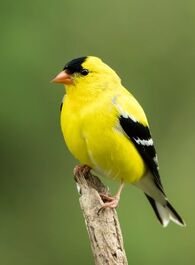 Wild birds like this American goldfinch can contract and spread salmonellosis. Photo by N. Lewis, National Park Service. Wild birds like this American goldfinch can contract and spread salmonellosis. Photo by N. Lewis, National Park Service. In March and April 2021, outbreaks of Salmonella infection linked to wild songbirds, ground turkey, and small turtles were reported, and several brands of dog and cat food were recalled because of possible Salmonella contamination.[1,2] Dogs and cats are at risk of illness from salmonellosis. However, healthy adult animals infected with these bacteria often become carriers with no symptoms. Salmonella are zoonotic—they spread between humans and other animals—so a major concern with Salmonella infection in animals is that it increases the risk for people. Sources Animal Carriers Salmonella are spread through the feces of infected animals. These are some of the animals that carry Salmonella and expose people to infection:
Contaminated Food and Water People and animals are most often infected with Salmonella by eating food or drinking water contaminated with feces. Handling contaminated food is also a risk if you don’t wash your hands thoroughly afterward to avoid bringing the bacteria to your mouth. Potential sources of Salmonella infection in humans, dogs, and cats include the following:
Environmental Sources Animals carrying Salmonella shed the bacteria into their environment. Animals that seem completely healthy can be Salmonella carriers. It’s safest to assume that Salmonella are present anywhere an animal of a high-risk species spends time: reptile habitats, terrariums, aquariums, chicken coops, animal pens, and so forth. Bedding and water tanks or bowls (especially in reptile and amphibian habitats) can also be contaminated. Bird Feeders and Birdbaths Wild songbirds aren’t just Salmonella carriers; sometimes they get sick and die of Salmonella infection. The type of Salmonella that birds carry, S typhimurium, is contagious to people and other animals. Cats who hunt birds or hang out under bird feeders and birdbaths can be infected. Symptoms Many adult dogs and cats exposed to Salmonella don’t get sick but can still spread the bacteria. Puppies, kittens, stressed animals, immunosuppressed animals, and animals with other diseases are more likely to become ill with salmonellosis. Symptoms include lethargy, loss of appetite, vomiting, fever, and diarrhea. The infection can be fatal in fetuses and newborns. Salmonellosis in cats infected by birds is called songbird fever. Symptoms are similar to salmonellosis in other animals: vomiting, bloody diarrhea, lethargy, and loss of appetite. Treatment As with most diseases, specific treatment depends on the individual animal’s needs. Salmonella can develop resistance to antibiotics, so animals with mild symptoms might be treated only with supportive measures. In some cases, the choice of antibiotic is based on results of culture and antimicrobial sensitivity tests.[5] Prevention Be aware that raw meat pet diets are a common source of Salmonella. The CDC recommends these measures to prevent Salmonella infections:
References 1. Reports of selected Salmonella outbreak investigations. Centers for Disease Control and Prevention. Accessed April 20, 2021. https://www.cdc.gov/salmonella/outbreaks.html 2. Recalls, market withdrawals, & safety alerts. US Food & Drug Administration. Accessed April 20, 2021. https://www.fda.gov/safety/recalls-market-withdrawals-safety-alerts 3. Salmonella infection. Centers for Disease Control and Prevention. Accessed April 20, 2021. https://www.cdc.gov/healthypets/diseases/salmonella.html 4. Kukanich KS. Update on Salmonella spp contamination of pet food, treats, and nutritional products and safe feeding recommendations. J Am Vet Med Assoc. 2011;238(11):1430-1434. doi:10.2460/javma.238.11.1430 5. Marks SL, Rankin SC, Byrne BA, Weese JS. Enteropathogenic bacteria in dogs and cats: diagnosis, epidemiology, treatment, and control. J Vet Intern Med. 2011;25(6):1195-1208. doi:10.1111/j.1939-1676.2011.00821.x 6. Salmonella outbreak linked to wild songbirds. Centers for Disease Control and Prevention. April 1, 2021. Accessed April 20, 2021. https://www.cdc.gov/salmonella/typhimurium-04-21/index.html Image source: Shenandoah National Park (photo by N. Lewis, NPS) Comments are closed.
|
AuthorLaurie Anne Walden, DVM Categories
All
Archives
June 2024
The contents of this blog are for information only and should not substitute for advice from a veterinarian who has examined the animal. All blog content is copyrighted by Mallard Creek Animal Hospital and may not be copied, reproduced, transmitted, or distributed without permission.
|
- Home
- About
- Our Services
- Our Team
-
Client Education Center
- AKC: Spaying and Neutering your Puppy
- Animal Poison Control
- ASPCA Poisonous Plants
- AVMA: Spaying and Neutering your pet
- Biting Puppies
- Boarding Your Dog
- Caring for the Senior Cat
- Cats and Claws
- FDA warning - Bone treats
- Force Free Alliance of Charlotte Trainers
- Getting your Cat to the Vet - AAFP
- Holiday Hazards
- How To Feed Cats for Good Health
- How to Get the Most Out of your Annual Exam
- Indoor Cat Initiative - OSU
- Introducing Your Dog to Your Baby
- Moving Your Cat to a New Home
- Muzzle Training
- Osteoarthritis Checklist for Cats
- What To Do When You Find a Stray
- Our Online Store
- Dr. Walden's Blog
- Client Center
- Contact
- Cat Enrichment Month 2024
|
Office Hours
Monday through Friday 7:30 am to 6:00 pm
|
Mallard Creek Animal Hospital
2110 Ben Craig Dr. Suite 100
|
Site powered by Weebly. Managed by IDEXX Laboratories

 RSS Feed
RSS Feed